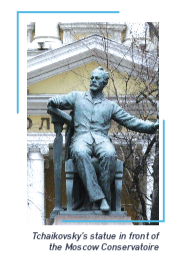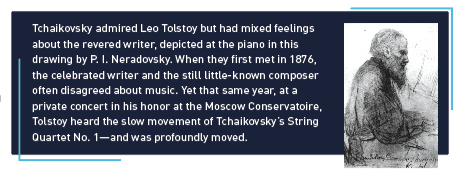 Composed 1871; 29 minutes
Composed 1871; 29 minutes
“They don’t want to know anything else!” Tchaikovsky complained more than a decade after composing the slow movement of his First String Quartet. The piece became an instant success for the struggling 31-year-old composer and was quickly arranged for violin by the virtuoso Leopold Auer. Numerous adaptations followed, including Tchaikovsky’s own transcription for cello and orchestra. Like Borodin’s Nocturne and Barber’s Adagio for Strings, Tchaikovsky’s Andante cantabile became famous on its own, while its origins in the quartet remained little known.
The String Quartet No. 1, the earliest of Tchaikovsky’s three quartets, was also the first significant quartet by a Russian composer. From the outset, it demonstrates his fluency in string writing. Structurally, he adheres closely to the classical quartet tradition, following its conventions and proportions with precision. The first movement unfolds with a sense of space and expansiveness reminiscent of Schubert. Yet the harmonic language is unmistakably Tchaikovsky’s—an impressive feat considering his well-documented dislike of the string quartet medium and the few weeks he spent composing the work in February 1871.

The wistfully nostalgic Andante cantabile is built around a folksong Tchaikovsky heard in the countryside, a melody he had already arranged in a collection for piano duet. In the quartet, he skillfully intertwines the tune with an original theme of his own. The movement’s gentle close contrasts sharply with the vigorous Scherzo and exuberant finale. Despite his reservations about the quartet as a medium, Tchaikovsky never betrays them in the music. He took pride in his First Quartet, later writing: “Perhaps I was never so flattered in my life, nor was my pride as a composer so stirred, as when Leo Tolstoy, sitting beside me, listening to the Andante of my First Quartet, dissolved into tears.”